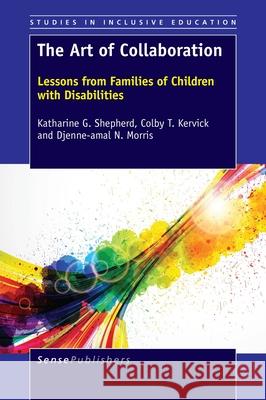The Art of Collaboration » książka
The Art of Collaboration
ISBN-13: 9789463008228 / Angielski / Miękka / 2017 / 198 str.
The Art of Collaboration
ISBN-13: 9789463008228 / Angielski / Miękka / 2017 / 198 str.
(netto: 178,49 VAT: 5%)
Najniższa cena z 30 dni: 179,73
ok. 22 dni roboczych.
Darmowa dostawa!
i>The Art of Collaboration: Lessons from Families of Children with Disabilities, co-authored by two professors of education and a parent of a child with disabilities, draws on the literature as well as original research to explore the meaning of collaboration and the benefits and barriers to developing positive school and family partnerships. The voices and stories of families of children with a variety of disabilities and experiences are at the heart of the book, providing insights into how we might re-conceptualize collaboration as an ongoing process and an "art" built on a shared commitment to improving the lives of children and families. The book begins with an overview of the research on collaboration and explores key themes, including the process of identifying a disability, the meaning of parent knowledge and expertise in the digital age, the potential to join parent and professional knowledge for the benefit of the child and family, and approaches leading to meaningful collaboration and communication. These include a variety of family-centered tools and practices, strategies for promoting parent advocacy and leadership, and a focus on hope and resiliency. Each chapter concludes with questions for reflection and suggested activities, making it an ideal resource for both parents and professionals. Throughout, the authors critique the collaborative process, while focusing on its promises and possibilities for families, educators, and other professionals.
i>The Art of Collaboration: Lessons from Families of Children with Disabilities, co-authored by two professors of education and a parent of a child with disabilities, draws on the literature as well as original research to explore the meaning of collaboration and the benefits and barriers to developing positive school and family partnerships. The voices and stories of families of children with a variety of disabilities and experiences are at the heart of the book, providing insights into how we might re-conceptualize collaboration as an ongoing process and an “art” built on a shared commitment to improving the lives of children and families. The book begins with an overview of the research on collaboration and explores key themes, including the process of identifying a disability, the meaning of parent knowledge and expertise in the digital age, the potential to join parent and professional knowledge for the benefit of the child and family, and approaches leading to meaningful collaboration and communication. These include a variety of family-centered tools and practices, strategies for promoting parent advocacy and leadership, and a focus on hope and resiliency. Each chapter concludes with questions for reflection and suggested activities, making it an ideal resource for both parents and professionals. Throughout, the authors critique the collaborative process, while focusing on its promises and possibilities for families, educators, and other professionals.











